Find Help
More Items From Ergsy search
-

Heart Failure : When the heart becomes stiff?
Relevance: 100%
-
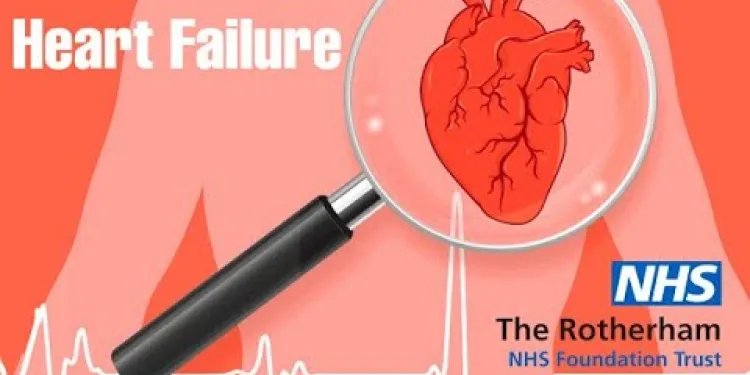
Heart Failure : What is heart failure?
Relevance: 81%
-
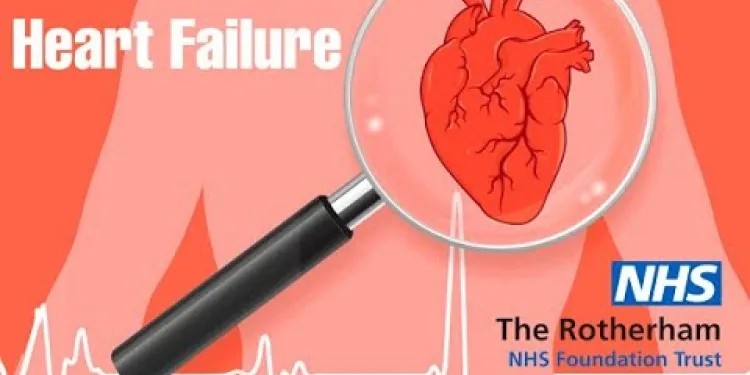
Heart Failure : Symptoms of heart failure
Relevance: 78%
-
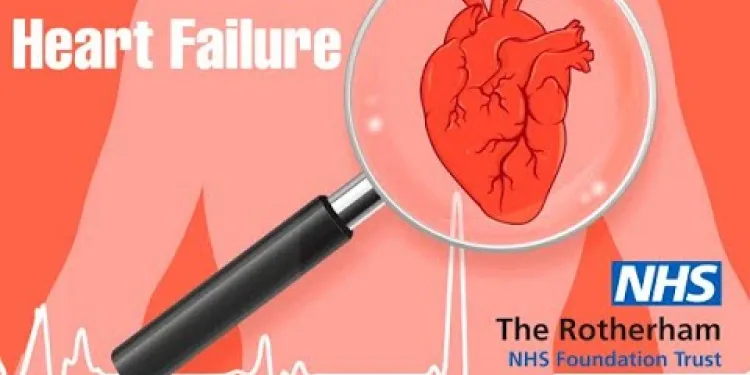
Heart Failure : Heart failure that cannot pump
Relevance: 75%
-

Heart Failure : The normal heart
Relevance: 75%
-
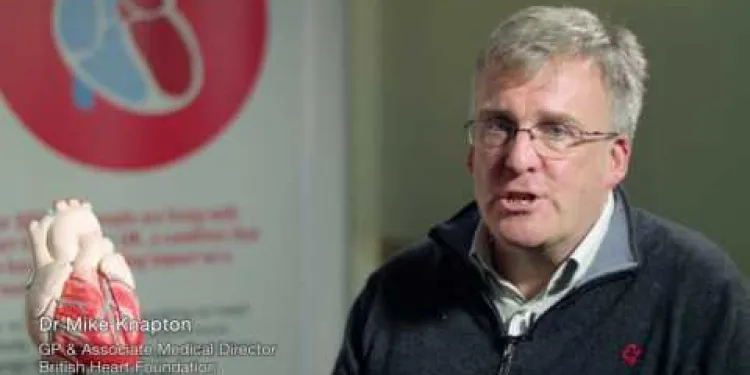
Heart failure introduction
Relevance: 75%
-
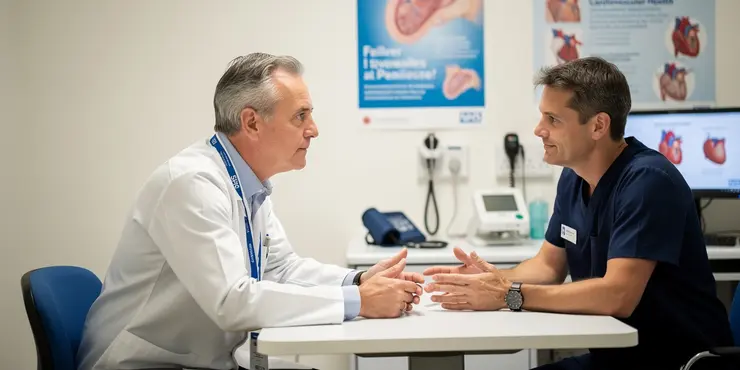
Are there different types of heart failure?
Relevance: 72%
-
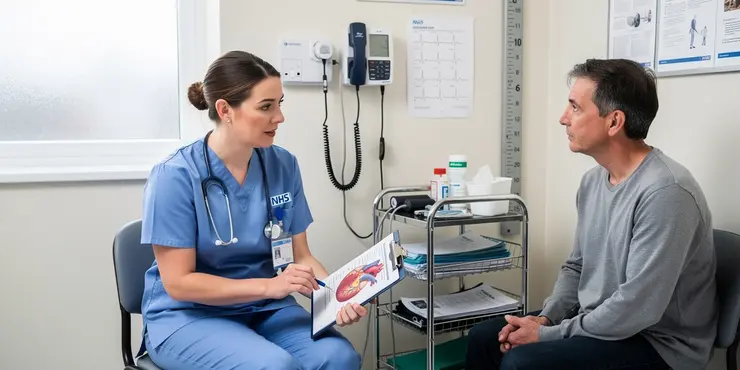
What causes heart failure?
Relevance: 69%
-
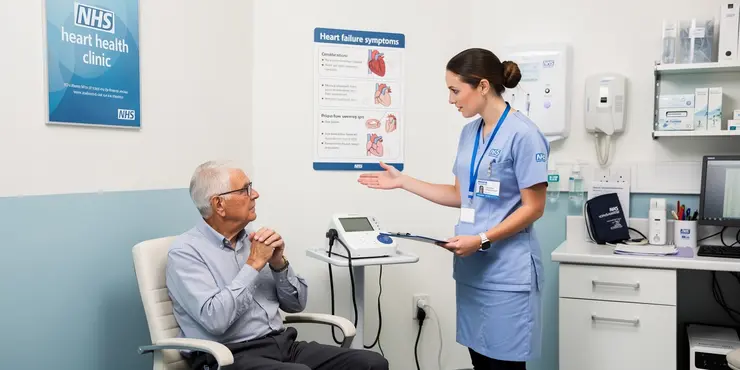
How is heart failure diagnosed?
Relevance: 69%
-

Can heart failure be prevented?
Relevance: 68%
-

Can heart failure be cured?
Relevance: 68%
-

What is the prognosis for someone with heart failure?
Relevance: 65%
-
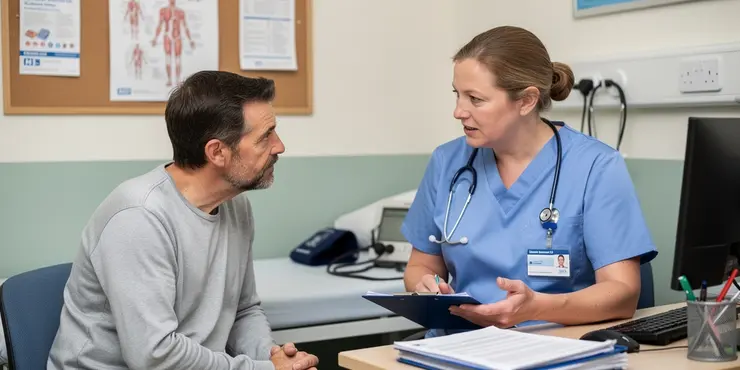
Is Baxdrostat used in treating heart failure?
Relevance: 65%
-

Can heart failure affect other organs?
Relevance: 63%
-

What is the role of diet in managing heart failure?
Relevance: 63%
-

How does exercise impact heart failure?
Relevance: 63%
-
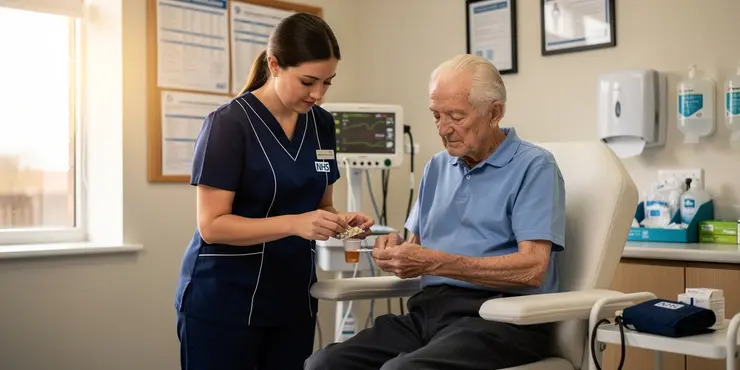
What medications are commonly prescribed for heart failure?
Relevance: 62%
-

Heart Failure : Treatment and monitoring of fluid retention
Relevance: 62%
-
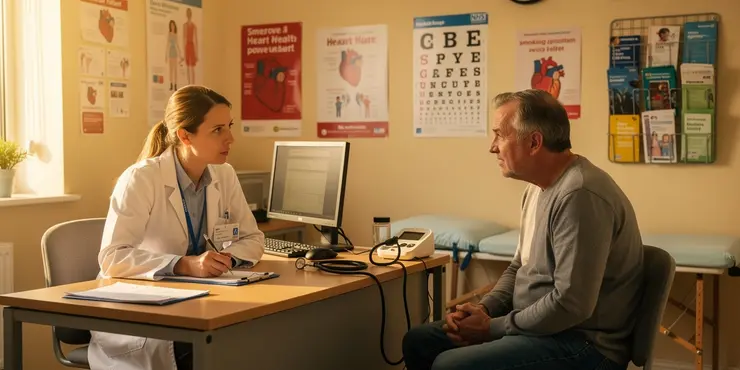
What should I do if I experience symptoms of heart failure?
Relevance: 60%
-

What is heart failure?
Relevance: 55%
-

Medicines of the heart
Relevance: 49%
-
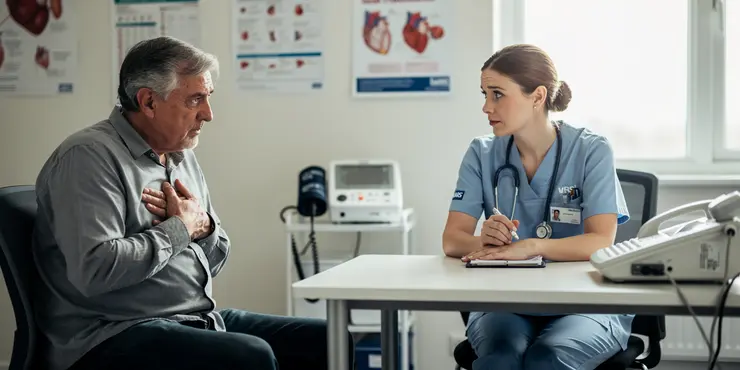
What are the common symptoms of heart failure?
Relevance: 49%
-

Heart stents
Relevance: 46%
-

What are the long-term effects of a heart attack?
Relevance: 44%
-

Is my abnormal heart rhythm dangerous?
Relevance: 44%
-
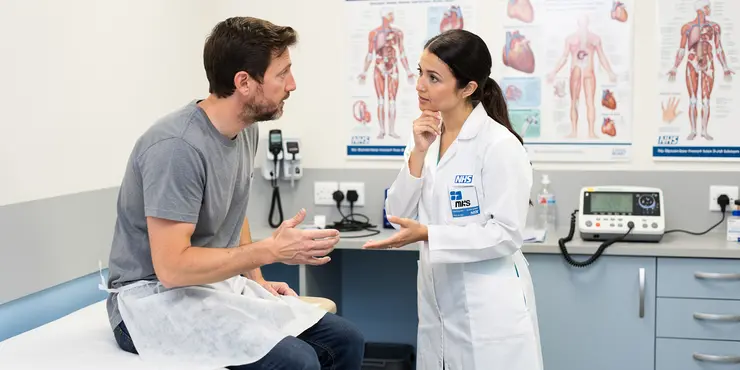
Is my abnormal heart rhythm dangerous?
Relevance: 43%
-
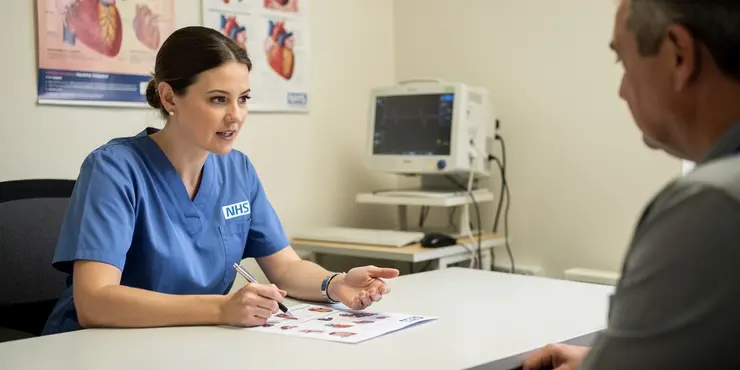
How do beta-blockers contribute to heart attack prevention?
Relevance: 42%
-

What lifestyle changes can help manage heart failure?
Relevance: 42%
-
What are the risk factors for a heart attack?
Relevance: 42%
-
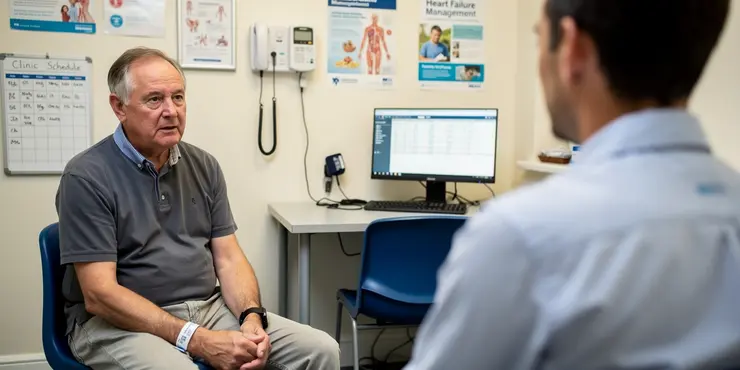
How often should someone with heart failure see their doctor?
Relevance: 42%
-
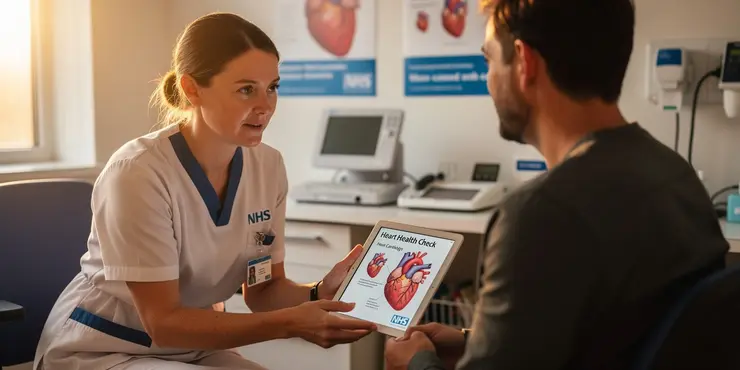
Is it possible to prevent a heart attack?
Relevance: 42%
-
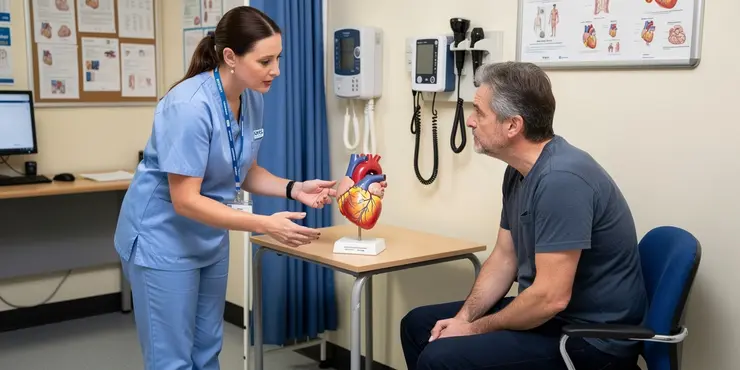
What is heart valve disease?
Relevance: 42%
-
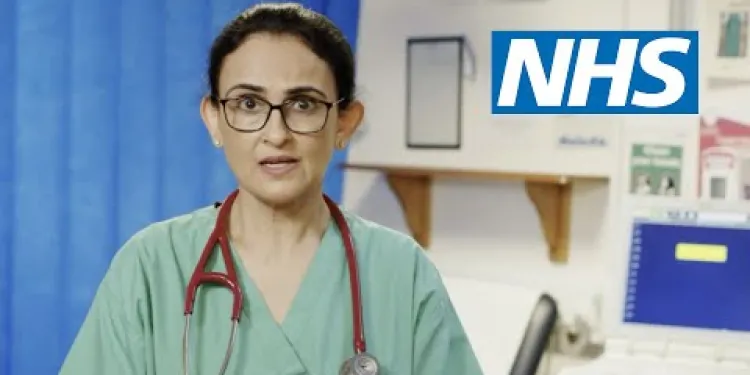
Heart Attack Stories | NHS
Relevance: 42%
-

Heart Attack Stories | NHS
Relevance: 42%
-

Does coffee consumption have any long-term heart health effects?
Relevance: 41%
-
Are there specific fats that support heart health?
Relevance: 40%
-
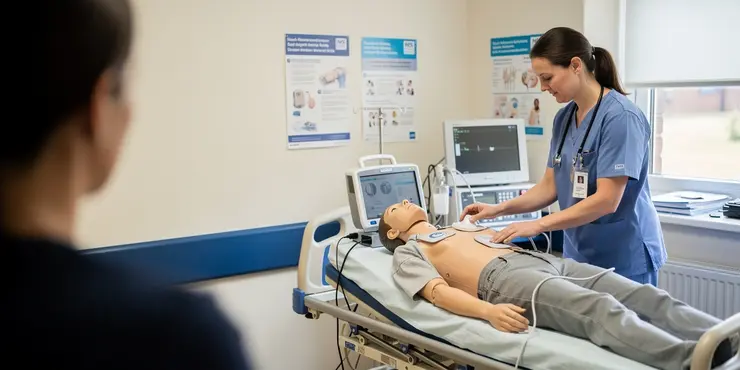
Can a defibrillator restart a stopped heart?
Relevance: 39%
-

Is it possible to have a heart attack without chest pain?
Relevance: 39%
-
Can physical exertion trigger a heart attack?
Relevance: 39%
-
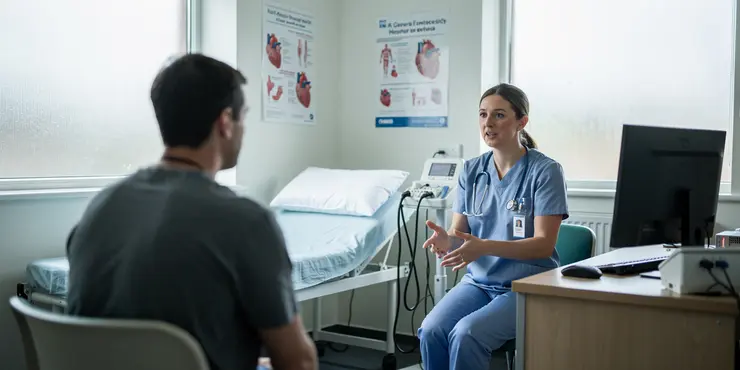
Are heart attack symptoms different for people with diabetes?
Relevance: 39%
Heart Failure: When the Heart Becomes Stiff
Understanding Heart Failure
Heart failure is a severe condition where the heart cannot pump blood efficiently to meet the body's needs. This condition affects millions across the globe, including many in the United Kingdom. Heart failure can result from various factors, including coronary artery disease, high blood pressure, or previous heart attacks. One specific form of this condition involves the heart muscle becoming stiff, making it difficult for the heart to fill properly with blood.Causes of Heart Stiffness
Heart stiffness, also known as diastolic dysfunction, occurs when the heart's ventricles (the main pumping chambers) lose their flexibility. This can happen due to several reasons: - **Hypertension (High Blood Pressure):** Chronic high blood pressure can cause the heart muscle to thicken and stiffen. - **Aging:** As people age, the heart muscle naturally becomes stiffer. - **Diabetes:** This condition can lead to changes in the heart muscle that promote stiffness. - **Obesity:** Excess weight can increase the risk of a stiff heart.Symptoms of Heart Failure with a Stiff Heart
Heart failure with a stiff heart may present several symptoms, often similar to other forms of heart failure: - **Shortness of Breath:** Difficulty breathing, especially during physical activity or when lying down. - **Fatigue:** Feeling overly tired and weak, even with minimal exertion. - **Swelling:** Swelling in the legs, ankles, and feet due to fluid buildup. - **Rapid or Irregular Heartbeat:** Palpitations or an abnormally fast heartbeat.Diagnosis and Treatment
Diagnosing heart failure with a stiff heart typically involves several tests: - **Echocardiogram:** An ultrasound of the heart to check its structure and function. - **Blood Tests:** To identify markers of heart failure and other related conditions. - **Electrocardiogram (ECG):** To monitor the heart’s electrical activity. - **Stress Tests:** To assess how the heart performs under physical stress. Treatment focuses on managing symptoms and addressing the underlying cause: - **Medications:** Diuretics to reduce fluid buildup, beta-blockers, and ACE inhibitors to manage blood pressure. - **Lifestyle Changes:** A healthy diet, regular physical activity, and weight management are crucial. - **Monitoring and Support:** Regular check-ups and support from healthcare providers are essential for managing the condition effectively.Living with Heart Failure
Living with heart failure requires a multifaceted approach. Patients in the United Kingdom have access to various resources, including NHS services, support groups, and educational materials. Making informed lifestyle choices, adhering to prescribed treatments, and maintaining regular communication with healthcare providers can significantly improve quality of life. Understanding the seriousness of heart failure and recognizing the importance of managing a stiff heart can help individuals make proactive health decisions. Early diagnosis and treatment are critical in preventing complications and enhancing overall well-being.Heart Failure: When the Heart Becomes Stiff
Understanding Heart Failure
Heart failure happens when the heart cannot pump blood well enough for the body. This problem affects many people around the world, including in the UK. Heart failure can happen because of things like heart disease, high blood pressure, or past heart attacks. One kind happens when the heart muscle gets stiff. This makes it hard for the heart to fill up with blood properly.Causes of Heart Stiffness
When the heart becomes stiff, it is called diastolic dysfunction. This means the heart's main pumping parts lose their flexibility. It can happen because of: - **High Blood Pressure:** This is when blood pushes too hard against the walls of arteries. It can make the heart muscle thick and stiff. - **Getting Older:** As people get older, their heart muscles can naturally get stiffer. - **Diabetes:** This is a disease that can change the heart muscle and make it stiff. - **Being Overweight:** Carrying too much weight can make it more likely for the heart to get stiff.Symptoms of Heart Failure with a Stiff Heart
When you have heart failure and a stiff heart, you might have these symptoms: - **Breathing Trouble:** It can be hard to breathe especially when you are active or lying down. - **Feeling Very Tired:** You might feel weak and tired even if you don't do much. - **Swelling:** Legs, ankles, and feet might swell because of too much fluid. - **Fast or Uneven Heartbeat:** Your heart might beat too fast or feel like it skips beats.Diagnosis and Treatment
To find out if someone has heart failure with a stiff heart, doctors might do these tests: - **Echocardiogram:** This is a special scan that lets doctors see how the heart looks and works. - **Blood Tests:** These tests check for signs of heart trouble and other health issues. - **ECG (Electrocardiogram):** This test checks how the heart's electrical system works. - **Stress Tests:** These show how the heart works when you are active. To help with this condition, doctors might: - **Give Medicines:** These can help with swelling, lower blood pressure, and help the heart. - **Suggest Lifestyle Changes:** Eating healthy foods, exercising regularly, and keeping a normal weight can help. - **Regular Check-Ups and Support:** Seeing doctors often and having support is very important.Living with Heart Failure
Living with heart failure means making many changes. In the UK, there are NHS services, support groups, and materials that can help. Making good choices, following doctor’s advice, and staying in touch with healthcare providers can make life better. Knowing about heart failure and how serious it is can help people make smart health choices. Finding problems early and getting treatment can help stop other problems and make life healthier and happier.Frequently Asked Questions
What is heart failure?
Heart failure is a condition where the heart is unable to pump blood effectively to meet the body's needs.
What does it mean when the heart becomes stiff?
When the heart becomes stiff, it means the heart muscle has become less elastic, making it difficult for the heart to fill with blood properly. This condition is often referred to as diastolic dysfunction or heart failure with preserved ejection fraction (HFpEF).
What are the common symptoms of heart failure?
Common symptoms include breathlessness, fatigue, swollen ankles, legs, or abdomen, and a rapid or irregular heartbeat.
How is heart failure diagnosed?
Heart failure is typically diagnosed through a combination of medical history, physical examination, blood tests, electrocardiograms (ECG), echocardiograms, and other imaging tests.
What causes the heart to become stiff?
Causes can include high blood pressure, diabetes, coronary artery disease, aging, and conditions that affect the heart muscle or valves.
Can heart failure be cured?
Heart failure cannot be cured, but it can be managed with lifestyle changes, medications, and in some cases, surgical interventions to improve the quality of life and prognosis.
What lifestyle changes can help manage heart failure?
Lifestyle changes include following a heart-healthy diet, maintaining a healthy weight, exercising regularly, quitting smoking, limiting alcohol intake, and managing stress.
What medications are commonly prescribed for heart failure?
Common medications include ACE inhibitors, beta-blockers, diuretics, and medications to reduce the workload on the heart and control symptoms.
Is heart failure the same as a heart attack?
No, heart failure is a chronic condition where the heart cannot pump blood effectively, while a heart attack occurs when blood flow to a part of the heart muscle is blocked, causing damage.
Can heart failure lead to other complications?
Yes, heart failure can lead to complications such as kidney damage, liver damage, arrhythmias, stroke, and a higher risk of infections.
How can one reduce the risk of developing heart failure?
Reducing risk factors includes controlling blood pressure, maintaining a healthy weight, eating a balanced diet, exercising regularly, avoiding tobacco use, and managing conditions like diabetes.
What should I do if I experience symptoms of heart failure?
If you experience symptoms such as shortness of breath, swelling, or extreme fatigue, you should seek medical attention promptly for an evaluation and proper diagnosis.
How often should one have check-ups if diagnosed with heart failure?
Patients with heart failure should have regular check-ups with their healthcare provider to monitor their condition and adjust treatment as needed.
Are there any surgical treatments for heart failure?
Surgical treatments may include coronary artery bypass grafting, heart valve repair or replacement, implantation of a pacemaker or defibrillator, and in severe cases, heart transplantation.
Is it safe to exercise with heart failure?
Yes, but it is important to consult with a healthcare provider to develop a safe and appropriate exercise plan tailored to your condition and capabilities.
What is heart failure?
Heart failure is when the heart does not work as well as it should. The heart is a muscle in your chest that pumps blood all around your body. If your heart cannot pump blood well, it is called heart failure.
People with heart failure might feel very tired. They might find it hard to breathe. They may feel their heart beating fast or irregular. It's important to see a doctor if someone has these problems.
To help understand heart failure better, you can:
- Look at pictures or videos about the heart.
- Talk to a doctor or nurse.
- Ask questions if something is not clear.
You can also ask someone you trust to help you read this.
Heart failure is when the heart can't pump blood well enough to give the body what it needs.
What happens when the heart gets stiff?
Sometimes, the heart can get hard and doesn't squeeze as well. This is called getting stiff.
When the heart is stiff, it can't move blood around the body very well. This can make someone feel tired or short of breath.
If you find it hard to understand, ask a grown-up or use a picture to help. Tools like drawing or using simple charts can make it easier to learn.
When the heart gets stiff, it means the heart muscle is not as stretchy as it should be. This makes it hard for the heart to fill up with blood. Doctors call this problem diastolic dysfunction or HFpEF.
What are the signs of heart problems?
Heart problems can make you feel tired and weak. You might find it hard to breathe, even when you are resting. Some people notice their feet, ankles, or stomach getting bigger. This can happen because water builds up in the body.
If you feel your heart beating fast or skipping beats, these can also be signs of heart problems. If you have these problems, it's important to talk to a doctor.
To help understand more about heart and health, you can use picture charts or watch videos. Talking to someone you trust can also be helpful.
Some common signs are finding it hard to breathe, feeling very tired, having swollen ankles, legs, or tummy, and having a fast or uneven heartbeat.
How do doctors find out if someone has heart failure?
Doctors use different ways to check if a person has heart failure. Here are some steps they might take:
- Talk and Listen: Doctors ask questions about how you feel. They want to know about any problems you have, like feeling tired or short of breath.
- Look at You: Doctors look at your body. They might check if your legs or feet are swollen.
- Listen to Your Heart: Doctors use a special tool called a stethoscope to listen to your heart.
- Tests: Doctors might do tests like a blood test or an X-ray to see how your heart is working. They might also do an ultrasound, which is a special picture of your heart.
If you find this hard to understand, you can:
- Ask someone you trust to explain it to you.
- Use pictures to help understand what doctors do.
Doctors find out if someone has heart failure in a few different ways. They will ask about your health in the past, check your body, take some blood tests, and use special machines like ECG and echocardiograms to look at your heart.
Why does the heart get stiff?
The heart is a muscle. Sometimes, it can become too stiff. This means it can't squeeze and relax like it should.
Here are some reasons why:
- Getting older: As people get older, their heart can get stiffer.
- Being sick: Some sicknesses can make the heart become stiff.
- High blood pressure: This can make the heart work too hard, which can lead to stiffness.
- Too much sugar in the blood: Things like diabetes can cause this problem.
To help, you can do some things:
- Talk to a doctor: They can check your heart.
- Eat healthy and move your body: This can help your heart stay strong.
Using pictures or a buddy to help you understand this can be good, too.
There are many things that can cause this. It can happen if you have high blood pressure, diabetes, or problems with your heart like coronary artery disease. It can also happen as you get older or if there are issues with the heart muscle or the heart valves.
To understand it better, you can:
- Use pictures or diagrams of the heart to see what it looks like.
- Listen to audio explanations if reading is hard.
- Ask someone to explain it to you in simple words.
Can we fix heart failure?
Heart failure is when the heart is not working well. It can be hard to make the heart all better. But, doctors can help you feel better and do more things.
Here are some ways to manage heart failure:
- Medicines: Doctors can give you medicine to help your heart work better.
- Healthy Eating: Eating fruits, vegetables, and healthy foods can help your heart.
- Exercise: Moving your body, like walking, can make you stronger. Ask your doctor what is safe for you.
- Support: Friends, family, and groups can help you. Sometimes using a notepad or a calendar can help remember things.
It is important to talk to your doctor. They will help you find the best way to feel better.
Heart failure means your heart doesn't work as well as it should. You can't make it go away completely, but you can make it better. You can do this by:
- Changing the way you live, like eating healthy food and exercising.
- Taking medicine that your doctor gives you.
- Sometimes, doctors might need to do surgery to help your heart.
These things can help you feel better and live longer. Ask for help if you find it hard to read or understand. You can use tools like audiobooks or text readers that read the text out loud for you.
What can you do to help your heart?
Here are some simple things you can do:
- Eat healthy food like fruits and vegetables.
- Try to do a little exercise, like walking, every day.
- Rest well and get enough sleep.
- Take your medicine as the doctor says.
- Visit your doctor for check-ups.
It's okay to ask family or friends for help. They can support you.
To be healthy, you can make some changes:
- Eat food that is good for your heart.
- Keep a healthy weight.
- Exercise often.
- Stop smoking.
- Drink less alcohol.
- Find ways to relax and feel less stress.
Using tools like a food diary or exercise app can help you keep track of your progress. Also, talking to a friend or joining a group can help you stay on track.
What medicines do doctors give for heart problems?
Here are some medicines doctors might give you if your heart is not working well:
- Pills to help your heart relax and pump better.
- Pills to help get rid of extra water in your body.
- Pills to make your heart beat strong and steady.
It’s important to ask your doctor if you have questions. You can also ask a family member or a friend to help you understand. You might use pictures or apps on a tablet or phone to learn more, too.
Some common medicines help the heart. They are:
- ACE inhibitors
- Beta-blockers
- Diuretics
- Medicines to help the heart work less hard and feel better
You can use tools like text-to-speech apps to read the text out loud, or highlight important words to remember them better.
Is heart failure the same as a heart attack?
No, heart failure and a heart attack are not the same. They are different problems with the heart.
Heart failure: This happens when the heart is not strong enough to pump blood well.
Heart attack: This happens when blood cannot reach a part of the heart because of a blockage. This can hurt the heart.
To learn more, you can talk to a doctor or use these tools:
- Simple videos about the heart
- Pictures showing how the heart works
- Friends or family who can help explain
No, these are not the same. Heart failure is a long-lasting problem. It means the heart can't push blood around the body well. A heart attack is when blood can't get to part of the heart. This hurts the heart.
Here are some tips to help understand this:
- Use simple words.
- Break information into small steps.
- Ask someone to explain more if it's confusing.
Can heart failure cause other problems?
Yes, heart problems can cause other health issues. These can hurt the kidneys and liver, make the heartbeat uneven, and cause a stroke. People might also get sick more easily.
How can you keep your heart healthy?
Do you want to keep your heart strong? Here are some easy steps you can follow:
- Eat Healthy Foods: Try to eat lots of fruits, vegetables, and whole grains. Avoid too much salty or sugary foods.
- Be Active: Play outside, go for walks, or ride your bike. Try to move your body every day.
- Do Not Smoke: Smoking is very bad for your heart. Stay away from cigarettes.
- Keep a Healthy Weight: Ask a grown-up to help you eat the right amount of food. It is good to be a healthy weight.
- See a Doctor: Go to the doctor for check-ups. They help you stay healthy.
If you find reading hard, ask someone to read with you or use an audiobook. You can also use pictures or videos to help you understand. Keeping your heart healthy is very important. You can do it!
To stay healthy, it's important to:
- Keep your blood pressure normal.
- Stay at a healthy weight.
- Eat good foods with fruits and vegetables.
- Exercise often, like playing or going for a walk.
- Don't smoke cigarettes.
- Take care of things like diabetes if you have it.
Using pictures or simple checklists can help remember these steps!
What to Do if You Feel Signs of Heart Problems
If you feel like something is wrong with your heart, like it's not working well, here is what you can do:
Tell Someone: Talk to an adult you trust. It could be a family member, friend, or teacher.
Visit a Doctor: Ask someone to take you to see a doctor. The doctor can check what is happening with your heart.
Write It Down: Keep a little notebook to write how you feel. This can help you remember to tell the doctor everything.
Don’t Be Scared: It’s important to stay calm and know that people can help you feel better.
You can also use pictures to show how you feel or use simple words if that helps.
If you have trouble breathing, your body feels puffy, or you are very tired, you need to see a doctor quickly. The doctor can check what is wrong and help you feel better.
How often should you see a doctor if you have heart problems?
It's important to visit your doctor regularly if you have heart problems. Your doctor will tell you how often to come. Most people should go at least once every 6 months. This helps keep your heart healthy.
Helpful tip: Write down your check-up dates on a calendar or ask a friend to remind you. This way, you won't forget!
People with heart problems need to visit their doctor often. The doctor checks how they are doing and changes their medicine if needed.
Can doctors do surgery for heart problems?
Yes, doctors can do surgery to help some heart problems. If you or someone you know has heart problems, talk to a doctor to find out what can help.
Some people also use helpful tools, like pictures or videos, to understand more about their heart and the treatments.
Surgery might include these treatments: fixing or replacing heart valves, putting in a pacemaker or defibrillator to help the heart beat, doing coronary artery bypass grafting to help blood reach the heart, and, in very serious cases, getting a new heart with a heart transplant.
Can you exercise if your heart is not working well?
Yes, you can. But it's important to talk to a doctor first. They can help you make a safe exercise plan that's right for you.
Useful Links
This website offers general information and is not a substitute for professional advice.
Always seek guidance from qualified professionals.
If you have any medical concerns or need urgent help, contact a healthcare professional or emergency services immediately.
Some of this content was generated with AI assistance. We’ve done our best to keep it accurate, helpful, and human-friendly.
- Ergsy carfully checks the information in the videos we provide here.
- Videos shown by Youtube after a video has completed, have NOT been reviewed by ERGSY.
- To view, click the arrow in centre of video.
- Most of the videos you find here will have subtitles and/or closed captions available.
- You may need to turn these on, and choose your preferred language.
- Go to the video you'd like to watch.
- If closed captions (CC) are available, settings will be visible on the bottom right of the video player.
- To turn on Captions, click settings .
- To turn off Captions, click settings again.
More Items From Ergsy search
-

Heart Failure : When the heart becomes stiff?
Relevance: 100%
-

Heart Failure : What is heart failure?
Relevance: 81%
-

Heart Failure : Symptoms of heart failure
Relevance: 78%
-

Heart Failure : Heart failure that cannot pump
Relevance: 75%
-

Heart Failure : The normal heart
Relevance: 75%
-

Heart failure introduction
Relevance: 75%
-

Are there different types of heart failure?
Relevance: 72%
-

What causes heart failure?
Relevance: 69%
-

How is heart failure diagnosed?
Relevance: 69%
-

Can heart failure be prevented?
Relevance: 68%
-

Can heart failure be cured?
Relevance: 68%
-

What is the prognosis for someone with heart failure?
Relevance: 65%
-

Is Baxdrostat used in treating heart failure?
Relevance: 65%
-

Can heart failure affect other organs?
Relevance: 63%
-

What is the role of diet in managing heart failure?
Relevance: 63%
-

How does exercise impact heart failure?
Relevance: 63%
-

What medications are commonly prescribed for heart failure?
Relevance: 62%
-

Heart Failure : Treatment and monitoring of fluid retention
Relevance: 62%
-

What should I do if I experience symptoms of heart failure?
Relevance: 60%
-

What is heart failure?
Relevance: 55%
-

Medicines of the heart
Relevance: 49%
-

What are the common symptoms of heart failure?
Relevance: 49%
-

Heart stents
Relevance: 46%
-

What are the long-term effects of a heart attack?
Relevance: 44%
-

Is my abnormal heart rhythm dangerous?
Relevance: 44%
-

Is my abnormal heart rhythm dangerous?
Relevance: 43%
-

How do beta-blockers contribute to heart attack prevention?
Relevance: 42%
-

What lifestyle changes can help manage heart failure?
Relevance: 42%
-
What are the risk factors for a heart attack?
Relevance: 42%
-

How often should someone with heart failure see their doctor?
Relevance: 42%
-

Is it possible to prevent a heart attack?
Relevance: 42%
-

What is heart valve disease?
Relevance: 42%
-

Heart Attack Stories | NHS
Relevance: 42%
-

Heart Attack Stories | NHS
Relevance: 42%
-

Does coffee consumption have any long-term heart health effects?
Relevance: 41%
-
Are there specific fats that support heart health?
Relevance: 40%
-

Can a defibrillator restart a stopped heart?
Relevance: 39%
-

Is it possible to have a heart attack without chest pain?
Relevance: 39%
-
Can physical exertion trigger a heart attack?
Relevance: 39%
-

Are heart attack symptoms different for people with diabetes?
Relevance: 39%


